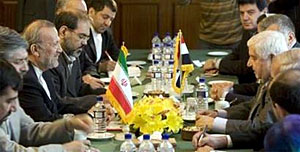Syria moves from 'pal' to Iranian vassal state

Syria moving formally into Iran's strategic orbit
Regardless of an Israeli withdrawal and a major U.S. aid package, Syria plans to maintain and develop its strategic alliance with Iran.
The regime of President Bashar Assad had sent messages via intermediaries to the United States that Damascus regards its ties with Teheran as vital and not threatening to regional interests.
The Assad message also stressed that Syria would not revise its support for the Iranian-sponsored Hizbullah.

Syrian Foreign Minister Walid al-Moualem (4th right) and his Iranian counterpart Manouchehr Mottaki (3rd left) hold a round of negotiations in Tehran on April 23. Reuters/Raheb Homavandi
Assad said Hizbullah, which sparked a war with Israel in 2006, was a legitimate group that sought to battle Israel's expansionism."It would be naive to think Syria will neglect or abandon its strategic alliances that do not stem from the Arab-Israeli conflict," Assad confidante Samir Taqi said.
Taqi, director of the Syrian-sponsored Center of Oriental Studies, relayed the Syrian message in an April 25 interview with Hizbullah's Al Manar television. Western intelligence sources said Taqi, a former adviser to the late Hafez Assad, was close to Bashar and speaks for the Syrian ruler.
Indeed, the intelligence sources said, Iran and Syria plan to enhance strategic cooperation over the next year. They said Damascus and Teheran have discussed joint procurement of advanced Russian weapons and air defense systems, particularly the S-300PMU2. The S-300PMU2 has been touted as an air defense network that could stop any Israeli or U.S. air strike on either Iran or Syria.
I seriously doubt it based on what I know. S-400 might have a better shot.
Iran and Syria have also been working together to acquire nuclear weapons technology and equipment from North Korea. The sources said Iran has helped finance North Korean nuclear contracts in Syria, including the establishment of the Al Kabir plutonium production plant in northeastern Syria. The plant was destroyed by the Israel Air Force in September 2007.
One scenario envisioned by the sources is that Iran would deploy one or several nuclear weapons in Syria. This would ensure the accuracy of any Iranian nuclear strike against Israel, which contains a large Muslim minority.
When was the last time a state allowed nuclear weapons controlled by another to target a neighbor directly?
October 1962. Think the Iranians would react as the Russians did? Think the Israelis would act as we did?
Rx for regional nuclear war.
- B4 Ww2, Hitler Paid Stalin To Train The Wehrmacht, And Had Manufacturing Facilities There To Cheat On The Versailles Pact, So Now..
What axis of evil? GERTZ: Iran paid N. Korea for plutonium facility and had scientists based there LONDON -- Western intelligence sources said Iranian scientists were stationed at the Syrian plutonium production plant in Al Kibar,...
- "iran-syria Ties Are Strategic Ties Founded On The National Interests Of The Two Countries And The World Of Islam" Uh, Whatever
Iran, Syria sign another military cooperation agreement NICOSIA GERTZ-- Iran and Syria have signed another memorandum of understanding meant to expedite weapons procurement during the visit to Teheran by Syrian Defense Minister...
- Israeli Jets Are Running Drills For An Attack On Iran
Yes! Fuck 'em up, my Israeli friends: Israeli Jets Run Iran Attack Drill NY Post September 08, 2007 JERUSALEM - Israeli warplanes may have been testing air routes for a possible attack against Iran when they were fired on by Syrian forces, experts...
- Iran Moves In On Syria ... It's The Religion Stupid...
Iran buying 'whole villages' of converts in Syria; Assad gives 'carte blanche' Gertz.... WASHINGTON — Iran is moving in on Syria to the point of encouraging Alawis and Sunnis to convert to Shi'ite Islam. Syrian opposition sources...
- Israel Planning For War Against Iran And Syria
From the London Times: THREATENED by a potentially nuclear-armed Tehran, Israel is preparing for a possible war with both Iran and Syria, according to Israeli political and military sources. The conflict with Hezbollah has led to a strategic rethink...
